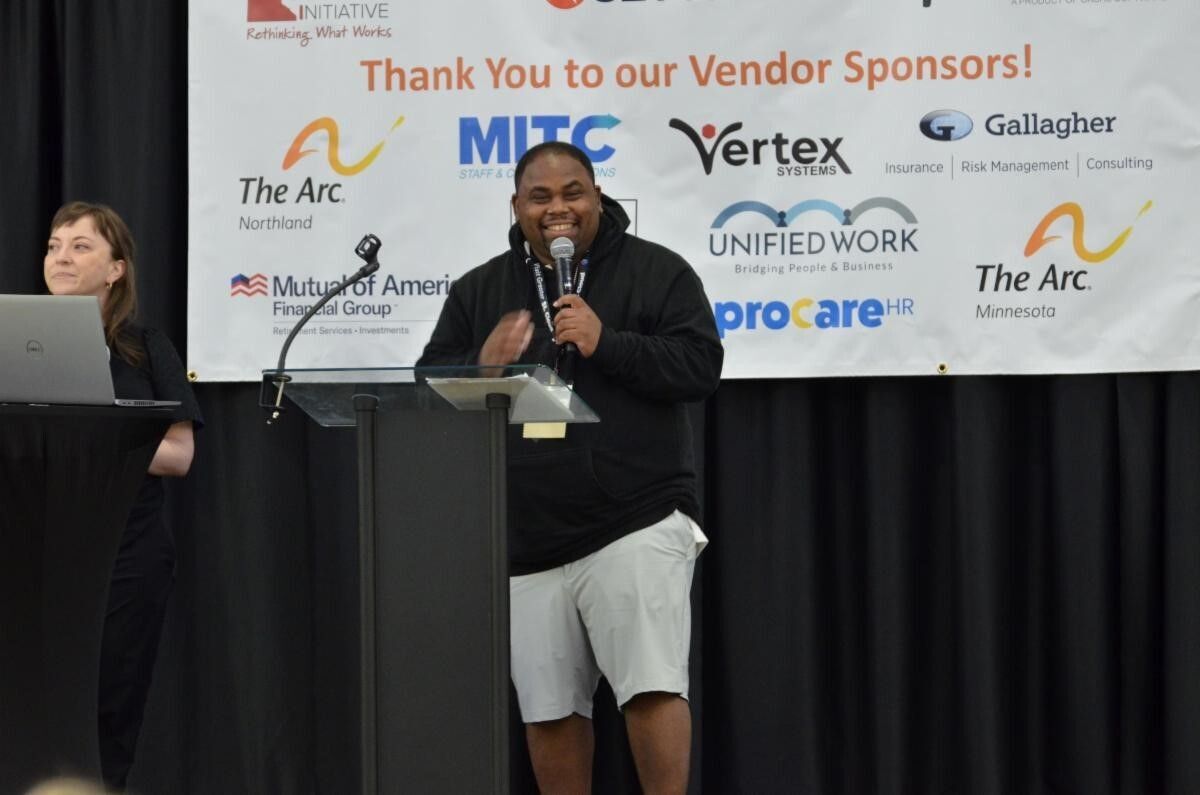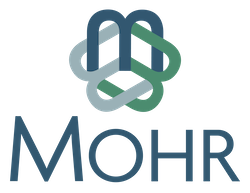
Mentoring for Competitive Employment
For many, speaking in front of a roomful of people is their worst nightmare. Not so for self-advocate and behavioral support professional Dupree Edwards. “I love speaking in front of people – it brings out the best in me.”
Participants at this year’s Spring Conference in St. Cloud had a chance to see Edwards live out his dream job in real time when he and Olivia Lape, program manager at The Arc Minnesota, spoke to MOHR members about the Arc’s new Peer-to-Peer Mentor Program, a multi-agency effort to further the Minnesota Transformation Initiative Technical Assistance Center contract with the Department of Human Services.
The goal is to help people with disabilities and the people who support them explore job options and learn from peers who are already in the working world, as well as families who have supported loved ones thinking about that transition. As a board member for The Arc Minnesota, and a member of the disabilities community, Edwards has provided his expertise as Lape built the grant-supported program. Edwards now gives group presentations to help people understand the program’s value and how to get involved. It’s his sweet spot.
“Sometimes people with intellectual disabilities find their dream jobs where they do good successfully,” explained Edwards. “I’m really good at working with the disability community.”
The Peer-to-Peer Mentor Program offers 1:1 mentoring for people considering competitive employment, as well as group options in person, via Zoom or telephone. The program initially started working with eight center-based employment programs in Minnesota and is now working with anyone interested in Competitive Integrated Employment (CIE), as well as metro-area school districts.
“We are always seeking more great mentors,” said Lape. “We are especially in need of bilingual mentors, so that we can ensure we are offering mentorship to a broad and diverse range of people.”
One of the agencies the Peer-to-Peer Mentor Program has worked with is Rise in Fridley. Lisa Carlson is an employment exploration specialist with Rise and has worked with many families in that capacity. As a parent of two young adults with disabilities, Carlson understands firsthand the concerns families have with regard to competitive employment. One of her sons has worked at a machinery shop for ten years, building strong relationships with his co-workers in the process. Carlson had no qualms about his journey.
It was a different story with her older son, who has done center-based work, as well as work with Goodwill prior to COVID. He struggled with the lack of continuity during the pandemic, and Carlson realized he needed to get out of the house. One option was competitive employment, but Carlson, whose job it is to support people who want to work in competitive jobs, wasn’t sold on how her son might be received in that world.
“I was worried about how people were going to treat Harry. How will he get to work? How will he navigate at work? His reading and understanding ability is lower than others – will he get hurt? Will people make fun of him?” said Carlson.
A co-worker urged Carlson to encourage her son to give it a try. He now works at Cub Foods, has learned how to take the bus to work, when he’s not riding his bike. He has a cell phone, which Carlson said eases her concerns and helps him be more independent. “I’ve worried about him but he has no fear about it. He does fantastic down there.”
The Peer-to-Peer program was not available when Carlson’s sons were looking for work, but her advice to parents is similar to what Edwards advises peers who are considering competitive employment, and more importantly, how to find jobs they are not just suited for, but jobs they really like.
“I like going with the flow,” said Edwards – meaning his flow. That included volunteering and putting himself out in the community. “As I got involved in everything, I started to understand what my dreams jobs were. I wanted to work in the non-profit disability community. I got involved in The Arc and with different counsels to build my resume. I built networks.” Edwards said that earned him the right to land his current job – as a behavioral support professional at the University of Minnesota’s Institute on Community Integration.
Carlson is also mindful of the resumes for the people she serves. Not every job will be a home run, but she advices employees to work with their support people if they are struggling. “A lot of times you can do a lot by talking to the person you serve and talking to the employer. A lot of times it’s a miscommunication,” Carlson said.
She advises people to stick with a job for at least six months to build their resume as a reliable worker. But the biggest chance of success is doing your homework up front. She tells parents to consider their adult children’s hobbies and things that interest them. If your adult child loves gaming, visit the local game store – find out if there are jobs there that could accommodate your child. Carlson was working with one individual who loved watches. She took him to a local shop that repairs watches. On his own he engaged the owner in a conversation about watches. The owner ended up offering that person a part time job.
Another trick is to set up mock interviews with willing employers. Carlson has seen people land jobs through those opportunities.
Opportunity is what Lape is hoping the Peer-to-Peer Mentor Program will provide. The program was recently renewed for another two years. Lape is hoping to expand the work to help people with disabilities make informed and self-directed decisions about their future with the help of others who have been on the same journey.
Right now the program is looking for additional peer mentors as well as family mentors who have loved ones working in competitive employment. Lape is also looking for groups that would like to learn more about the Peer-to-Peer program, as well as organizations and schools that would like to partner with the program. You can learn more about The Arc’s Peer-to-Peer Program here.
Carlson says she has learned firsthand that people can be far more capable than even their own family members realize. Not every effort will be successful, but the only way to find out is by getting out of your comfort zone.
“I think if I had one point to tell a parent and a person served is to try it. You only learn by failure.” Carlson says she never would have imagined her oldest son would have succeeded as much as he has if a co-worker had not nudged her to let him try. She knows that is a hard step to take in a world that is not always welcoming.
“Parents – we are their biggest disability because we want to shelter them.”
--
